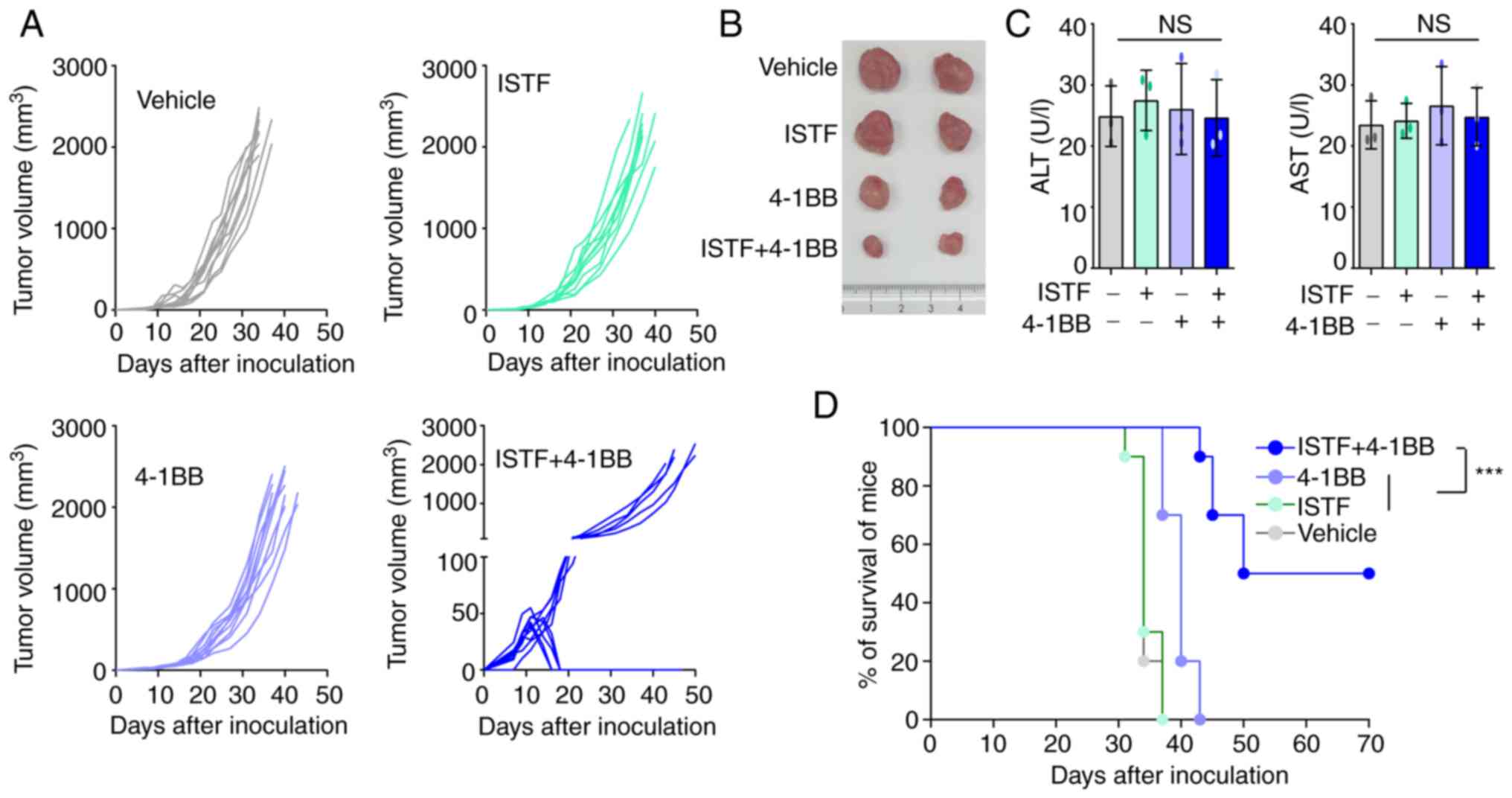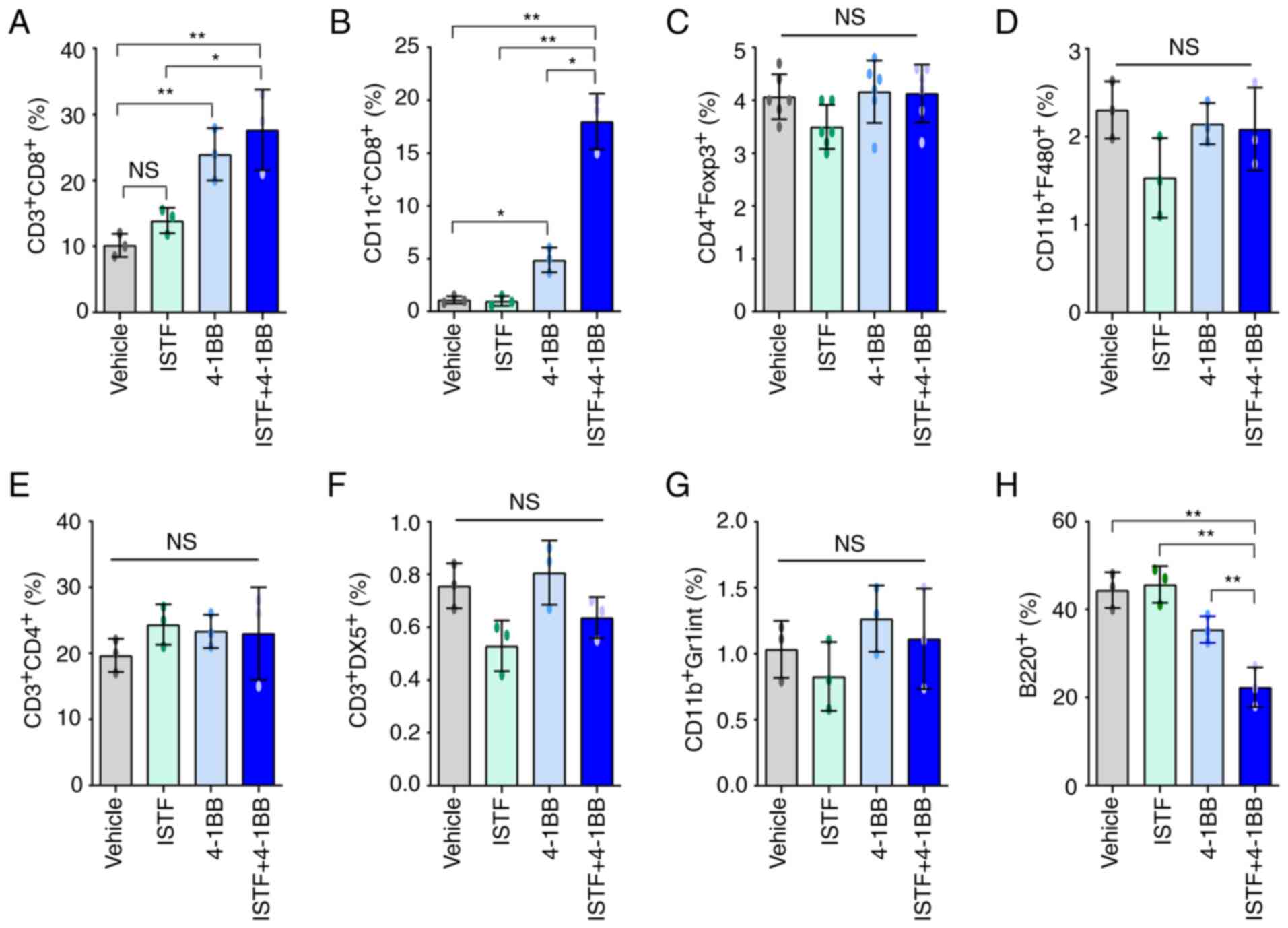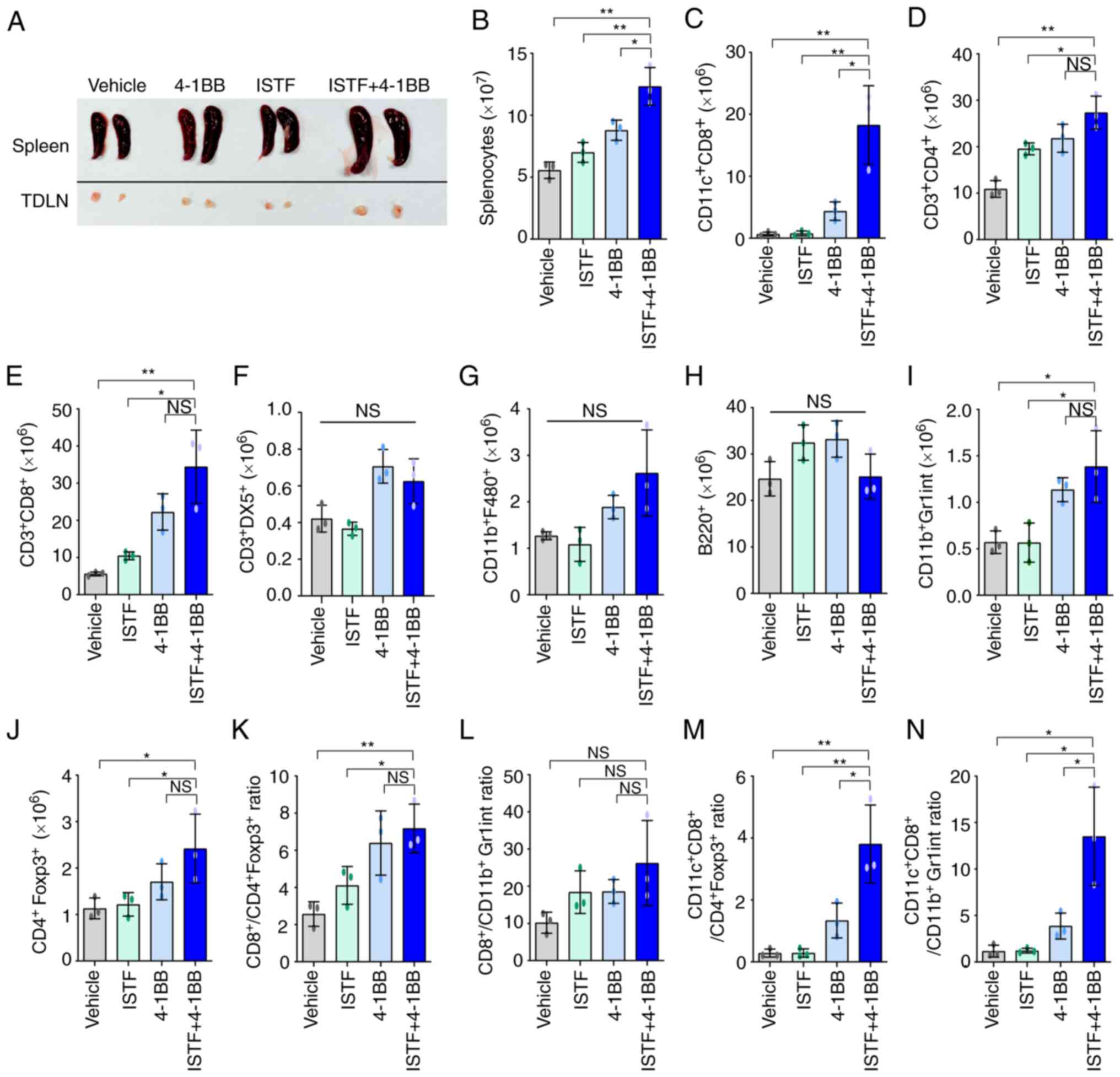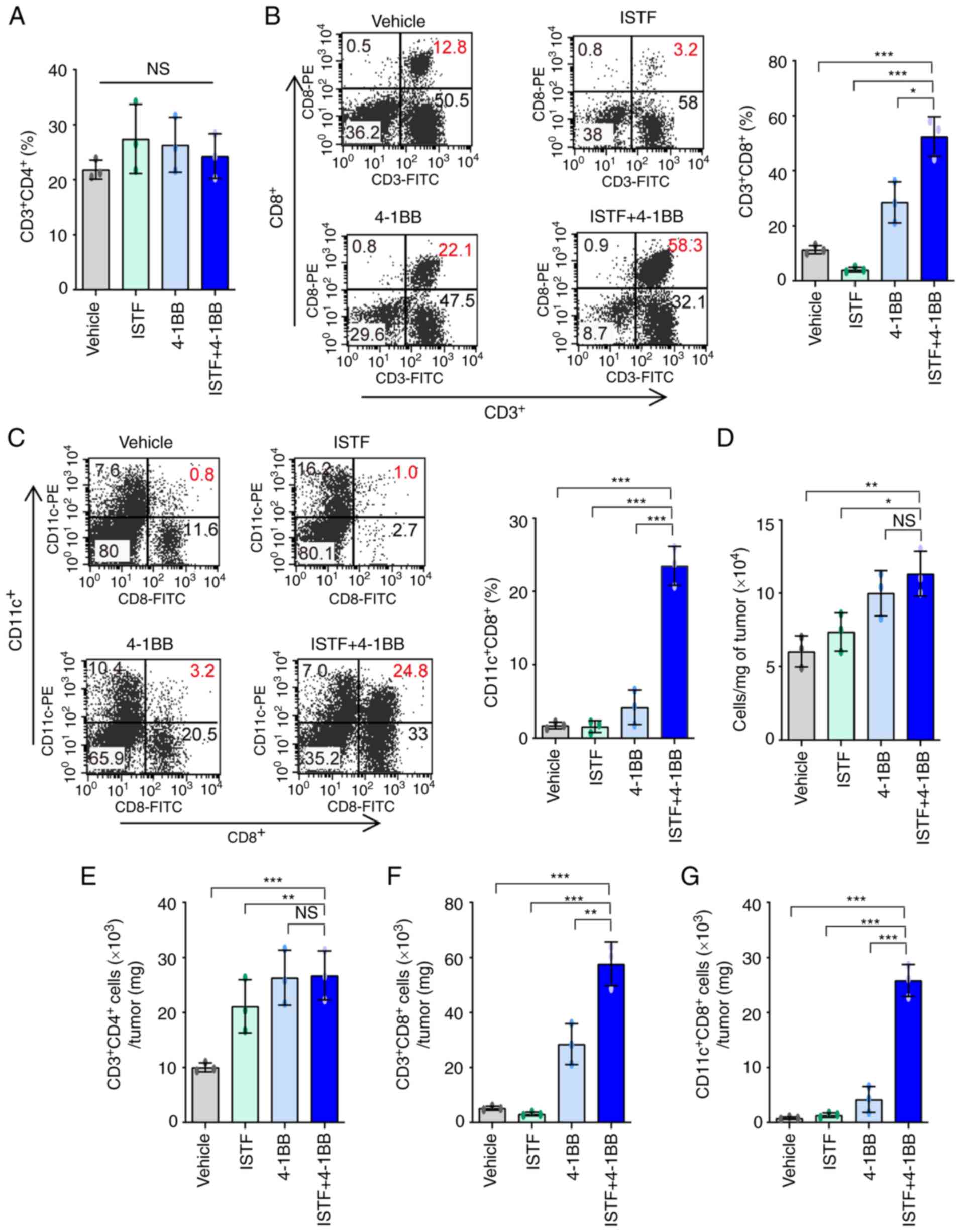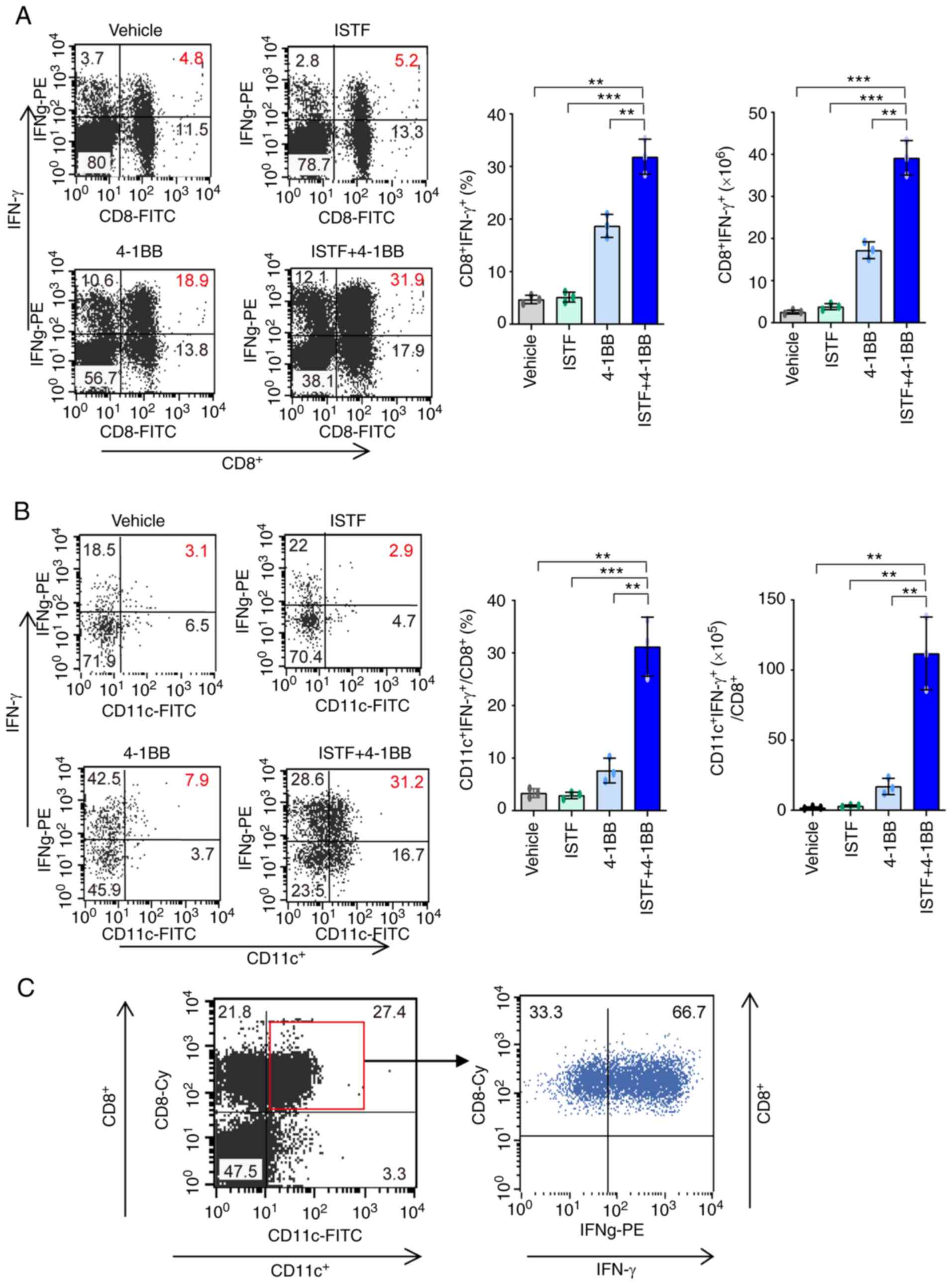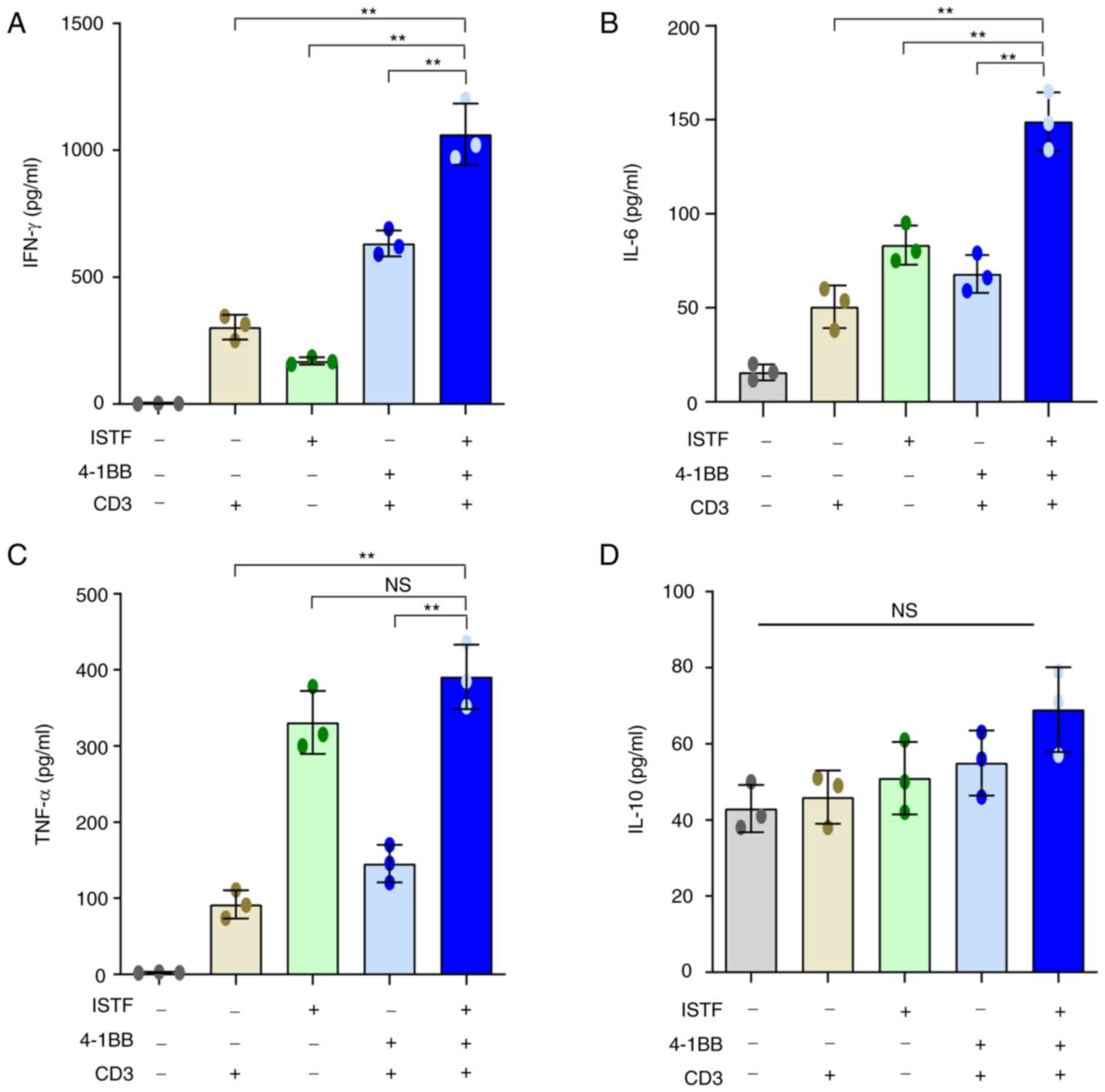|
1
|
Vitale MG and Carteni G: Recent
developments in second and third line therapy of metastatic renal
cell carcinoma. Expert Rev Anticancer Ther. 16:469–471. 2016.
View Article : Google Scholar : PubMed/NCBI
|
|
2
|
Makhov P, Joshi S, Ghatalia P, Kutikov A,
Uzzo RG and Kolenko VM: Resistance to systemic therapies in clear
cell renal cell carcinoma: Mechanisms and management strategies.
Mol Cancer Ther. 17:1355–1364. 2018. View Article : Google Scholar : PubMed/NCBI
|
|
3
|
Bartkowiak T and Curran MA: 4-1BB
Agonists: Multi-potent potentiators of tumor immunity. Front Oncol.
5:1172015. View Article : Google Scholar : PubMed/NCBI
|
|
4
|
Yagoda A, Abi-Rached B and Petrylak D:
Chemotherapy for advanced renal-cell carcinoma: 1983–1993. Semin
Oncol. 22:42–60. 1995.PubMed/NCBI
|
|
5
|
Reeves DJ and Liu CY: Treatment of
metastatic renal cell carcinoma. Cancer Chemother Pharmacol.
64:11–25. 2009. View Article : Google Scholar : PubMed/NCBI
|
|
6
|
Hah YS and Koo KC: Immunology and
immunotherapeutic approaches for advanced renal cell carcinoma: A
comprehensive review. Int J Mol Sci. 22:44522021. View Article : Google Scholar : PubMed/NCBI
|
|
7
|
Brown LC, Desai K, Zhang T and Ornstein
MC: The immunotherapy landscape in renal cell carcinoma. BioDrugs.
34:733–748. 2020. View Article : Google Scholar : PubMed/NCBI
|
|
8
|
Considine B and Hurwitz ME: Current status
and future directions of immunotherapy in renal cell carcinoma.
Curr Oncol Rep. 21:342019. View Article : Google Scholar : PubMed/NCBI
|
|
9
|
Negrier S, Escudier B, Lasset C, Douillard
JY, Savary J, Chevreau C, Ravaud A, Mercatello A, Peny J, Mousseau
M, et al: Recombinant human interleukin-2, recombinant human
interferon alfa-2a, or both in metastatic renal-cell carcinoma.
Groupe Francais d'Immunotherapie. N Engl J Med. 338:1272–1278.
1998. View Article : Google Scholar : PubMed/NCBI
|
|
10
|
Sica G and Chen L: Modulation of the
immune response through 4-1BB. Adv Exp Med Biol. 465:355–362. 2000.
View Article : Google Scholar : PubMed/NCBI
|
|
11
|
Vinay DS and Kwon BS: Role of 4-1BB in
immune responses. Semin Immunol. 10:481–489. 1998. View Article : Google Scholar : PubMed/NCBI
|
|
12
|
Melero I, Shuford WW, Newby SA, Aruffo A,
Ledbetter JA, Hellström KE, Mittler RS and Chen L: Monoclonal
antibodies against the 4-1BB T-cell activation molecule eradicate
established tumors. Nat Med. 3:682–685. 1997. View Article : Google Scholar : PubMed/NCBI
|
|
13
|
Miller RE, Jones J, Le T, Whitmore J,
Boiani N, Gliniak B and Lynch DH: 4-1BB-specific monoclonal
antibody promotes the generation of tumor-specific immune responses
by direct activation of CD8 T cells in a CD40-dependent manner. J
Immunol. 169:1792–1800. 2002. View Article : Google Scholar : PubMed/NCBI
|
|
14
|
Taraban VY, Rowley TF, O'Brien L, Chan HT,
Haswell LE, Green MH, Tutt AL, Glennie MJ and Al-Shamkhani A:
Expression and costimulatory effects of the TNF receptor
superfamily members CD134 (OX40) and CD137 (4–1BB), and their role
in the generation of anti-tumor immune responses. Eur J Immunol.
32:3617–3627. 2002. View Article : Google Scholar : PubMed/NCBI
|
|
15
|
Wilcox RA, Flies DB, Zhu G, Johnson AJ,
Tamada K, Chapoval AI, Strome SE, Pease LR and Chen L: Provision of
antigen and CD137 signaling breaks immunological ignorance,
promoting regression of poorly immunogenic tumors. J Clin Invest.
109:651–659. 2002. View Article : Google Scholar : PubMed/NCBI
|
|
16
|
Ju SA, Cheon SH, Park SM, Tam NQ, Kim YM,
An WG and Kim BS: Eradication of established renal cell carcinoma
by a combination of 5-fluorouracil and anti-4-1BB monoclonal
antibody in mice. Int J Cancer. 122:2784–2790. 2008. View Article : Google Scholar : PubMed/NCBI
|
|
17
|
Wallin JJ, Bendell JC, Funke R, Sznol M,
Korski K, Jones S, Hernandez G, Mier J, He X, Hodi FS, et al:
Atezolizumab in combination with bevacizumab enhances
antigen-specific T-cell migration in metastatic renal cell
carcinoma. Nat Commun. 7:126242016. View Article : Google Scholar : PubMed/NCBI
|
|
18
|
McDermott DF, Sosman JA, Sznol M, Massard
C, Gordon MS, Hamid O, Powderly JD, Infante JR, Fassò M, Wang YV,
et al: Atezolizumab, an Anti-programmed death-ligand 1 antibody, in
metastatic renal cell carcinoma: Long-term safety, clinical
activity, and immune correlates from a phase ia study. J Clin
Oncol. 34:833–842. 2016. View Article : Google Scholar : PubMed/NCBI
|
|
19
|
Zizzari IG, Napoletano C, Di Filippo A,
Botticelli A, Gelibter A, Calabrò F, Rossi E, Schinzari G, Urbano
F, Pomati G, et al: Exploratory pilot study of circulating
biomarkers in metastatic renal cell carcinoma. Cancers (Basel).
12:26202020. View Article : Google Scholar : PubMed/NCBI
|
|
20
|
Li Y, Wang Z, Jiang W, Zeng H, Liu Z, Lin
Z, Qu Y, Xiong Y, Wang J, Chang Y, et al: Tumor-infiltrating
TNFRSF9 + CD8 + T cells define different subsets of clear cell
renal cell carcinoma with prognosis and immunotherapeutic response.
Oncoimmunology. 9:18381412020. View Article : Google Scholar : PubMed/NCBI
|
|
21
|
Bromley GS and Solender M: Hand infection
caused by Actinobacillus actinomycetemcomitans. J Hand Surg
Am. 11:434–436. 1986. View Article : Google Scholar : PubMed/NCBI
|
|
22
|
Hofstad T and Stallemo A: Subacute
bacterial endocarditis due to Actinobacillus
actinomycetemcomitans. Scand J Infect Dis. 13:78–79. 1981.
View Article : Google Scholar : PubMed/NCBI
|
|
23
|
Patel PK and Seitchik MW:
Actinobacillus actinomycetemcomitans: A new cause for
granuloma of the parotid gland and buccal space. Plast Reconstr
Surg. 77:476–478. 1986. View Article : Google Scholar : PubMed/NCBI
|
|
24
|
Salman RA, Bonk SJ, Salman DG and Glickman
RS: Submandibular space abscess due to Actinobacillus
actinomycetemcomitans. J Oral Maxillofac Surg. 44:1002–1005.
1986. View Article : Google Scholar : PubMed/NCBI
|
|
25
|
Weir DM and Blackwell CC: Interaction of
bacteria with the immune system. J Clin Lab Immunol. 10:1–12.
1983.PubMed/NCBI
|
|
26
|
Jeong SJ, Yee ST, Jo WS, Yu SH, Lee SH,
Lim YJ, Yoo YH, Kim JM, Lee JD and Jeong MH: A novel factor
isolated from Actinobacillus actinomycetemcomitans
stimulates mouse B cells and human peripheral blood mononuclear
cells. Infect Immun. 68:5132–5138. 2000. View Article : Google Scholar : PubMed/NCBI
|
|
27
|
Jo WS, Yee ST, Yoon S, Nam BH, Do E, Jung
BS, Jeong SJ, Hong SH, Yoo YH, Kang CD, et al: Immunostimulating
factor isolated from Actinobacillus actinomycetemcomitans
stimulates monocytes and inflammatory macrophages. Microbiol
Immunol. 50:535–542. 2006. View Article : Google Scholar : PubMed/NCBI
|
|
28
|
Cheuk AT, Mufti GJ and Guinn BA: Role of
4-1BB:4-1BB ligand in cancer immunotherapy. Cancer Gene Ther.
11:215–226. 2004. View Article : Google Scholar : PubMed/NCBI
|
|
29
|
Schwartz RH: T cell anergy. Annu Rev
Immunol. 21:305–334. 2003. View Article : Google Scholar : PubMed/NCBI
|
|
30
|
Ju SA, Lee SC, Kwon TH, Heo SK, Park SM,
Paek HN, Suh JH, Cho HR, Kwon B, Kwon BS and Kim BS: Immunity to
melanoma mediated by 4-1BB is associated with enhanced activity of
tumour-infiltrating lymphocytes. Immunol Cell Biol. 83:344–351.
2005. View Article : Google Scholar : PubMed/NCBI
|
|
31
|
Shen Z, Zhou S, Wang Y, Li RL, Zhong C,
Liang C and Sun Y: Higher intratumoral infiltrated Foxp3+ Treg
numbers and Foxp3+/CD8+ ratio are associated with adverse prognosis
in resectable gastric cancer. J Cancer Res Clin Oncol.
136:1585–1595. 2010. View Article : Google Scholar : PubMed/NCBI
|
|
32
|
Sato E, Olson SH, Ahn J, Bundy B,
Nishikawa H, Qian F, Jungbluth AA, Frosina D, Gnjatic S, Ambrosone
C, et al: Intraepithelial CD8+ tumor-infiltrating lymphocytes and a
high CD8+/regulatory T cell ratio are associated with favorable
prognosis in ovarian cancer. Proc Natl Acad Sci USA.
102:18538–18543. 2005. View Article : Google Scholar : PubMed/NCBI
|
|
33
|
Ju SA, Park SM, Lee YS, Bae JH, Yu R, An
WG, Suh JH and Kim BS: Administration of 6-gingerol greatly
enhances the number of tumor-infiltrating lymphocytes in murine
tumors. Int J Cancer. 130:2618–2628. 2012. View Article : Google Scholar : PubMed/NCBI
|
|
34
|
Sarkar R, Mathew A and Sehrawat S:
Myeloid-derived suppressor cells confer infectious tolerance to
dampen virus-induced tissue immunoinflammation. J Immunol.
203:1325–1337. 2019. View Article : Google Scholar : PubMed/NCBI
|
|
35
|
Obregon-Henao A, Henao-Tamayo M, Orme IM
and Ordway DJ: Gr1(int)CD11b+ myeloid-derived suppressor cells in
Mycobacterium tuberculosis infection. PLoS One. 8:e806692013.
View Article : Google Scholar : PubMed/NCBI
|
|
36
|
Ju SA, Park SM, Lee SC, Kwon BS and Kim
BS: Marked expansion of CD11c+CD8+ T-cells in melanoma-bearing mice
induced by anti-4-1BB monoclonal antibody. Mol Cells. 24:132–138.
2007.PubMed/NCBI
|
|
37
|
Kim SH, Singh R, Han C, Cho E, Kim YI, Lee
DG, Kim YH, Kim SS, Shin DH, You HJ, et al: Chronic activation of
4-1BB signaling induces granuloma development in tumor-draining
lymph nodes that is detrimental to subsequent CD8+ T
cell responses. Cell Mol Immunol. 18:1956–1968. 2021. View Article : Google Scholar : PubMed/NCBI
|
|
38
|
Castro F, Cardoso AP, Goncalves RM, Serre
K and Oliveira MJ: Interferon-gamma at the crossroads of tumor
immune surveillance or evasion. Front Immunol. 9:8472018.
View Article : Google Scholar : PubMed/NCBI
|
|
39
|
Chen DS and Mellman I: Oncology meets
immunology: The cancer-immunity cycle. Immunity. 39:1–10. 2013.
View Article : Google Scholar : PubMed/NCBI
|
|
40
|
Chen DS and Mellman I: Elements of cancer
immunity and the cancer-immune set point. Nature. 541:321–330.
2017. View Article : Google Scholar : PubMed/NCBI
|
|
41
|
Bhat P, Leggatt G, Waterhouse N and Frazer
IH: Interferon-gamma derived from cytotoxic lymphocytes directly
enhances their motility and cytotoxicity. Cell Death Dis.
8:e28362017. View Article : Google Scholar : PubMed/NCBI
|
|
42
|
Llopiz D, Ruiz M, Infante S, Villanueva L,
Silva L, Hervas-Stubbs S, Alignani D, Guruceaga E, Lasarte JJ and
Sarobe P: IL-10 expression defines an immunosuppressive dendritic
cell population induced by antitumor therapeutic vaccination.
Oncotarget. 8:2659–2671. 2017. View Article : Google Scholar : PubMed/NCBI
|
|
43
|
Moore KW, de Waal Malefyt R, Coffman RL
and O'Garra A: Interleukin-10 and the interleukin-10 receptor. Annu
Rev Immunol. 19:683–765. 2001. View Article : Google Scholar : PubMed/NCBI
|
|
44
|
Motzer RJ, Bander NH and Nanus DM:
Renal-cell carcinoma. N Engl J Med. 335:865–875. 1996. View Article : Google Scholar : PubMed/NCBI
|
|
45
|
Vuong L, Kotecha RR, Voss MH and Hakimi
AA: Tumor microenvironment dynamics in clear-cell renal cell
carcinoma. Cancer Discov. 9:1349–1357. 2019. View Article : Google Scholar : PubMed/NCBI
|
|
46
|
Chester C, Sanmamed MF, Wang J and Melero
I: Immunotherapy targeting 4-1BB: Mechanistic rationale, clinical
results, and future strategies. Blood. 131:49–57. 2018. View Article : Google Scholar : PubMed/NCBI
|
|
47
|
Gros A, Robbins PF, Yao X, Li YF, Turcotte
S, Tran E, Wunderlich JR, Mixon A, Farid S and Dudley ME: PD-1
identifies the patient-specific CD8+ tumor-reactive
repertoire infiltrating human tumors. J Clin Invest. 124:2246–2259.
2014. View Article : Google Scholar : PubMed/NCBI
|
|
48
|
Ye Q, Song DG, Poussin M, Yamamoto T, Best
A, Li C, Coukos G and Powell DJ Jr: CD137 accurately identifies and
enriches for naturally occurring tumor-reactive T cells in tumor.
Clin Cancer Res. 20:44–55. 2014. View Article : Google Scholar : PubMed/NCBI
|
|
49
|
Ochoa AC, Zea AH, Hernandez C and
Rodriguez PC: Arginase, prostaglandins, and myeloid-derived
suppressor cells in renal cell carcinoma. Clin Cancer Res. 13
(Suppl):721s–726s. 2007. View Article : Google Scholar : PubMed/NCBI
|
|
50
|
Yu JW, Bhattacharya S, Yanamandra N,
Kilian D, Shi H, Yadavilli S, Katlinskaya Y, Kaczynski H, Conner M,
Benson W, et al: Tumor-immune profiling of murine syngeneic tumor
models as a framework to guide mechanistic studies and predict
therapy response in distinct tumor microenvironments. PLoS One.
13:e02062232018. View Article : Google Scholar : PubMed/NCBI
|
|
51
|
Segal NH, Logan TF, Hodi FS, McDermott D,
Melero I, Hamid O, Schmidt H, Robert C, Chiarion-Sileni V, Ascierto
PA, et al: Results from an integrated safety analysis of urelumab,
an agonist Anti-CD137 monoclonal antibody. Clin Cancer Res.
23:1929–1936. 2017. View Article : Google Scholar : PubMed/NCBI
|
|
52
|
Li Y, Tan S, Zhang C, Chai Y, He M, Zhang
CW, Wang Q, Tong Z, Liu K, Lei Y, et al: Limited cross-linking of
4-1BB by 4-1BB ligand and the agonist monoclonal antibody
utomilumab. Cell Rep. 25:909–920.e4. 2018. View Article : Google Scholar : PubMed/NCBI
|
|
53
|
Chin SM, Kimberlin CR, Roe-Zurz Z, Zhang
P, Xu A, Liao-Chan S, Sen D, Nager AR, Oakdale NS, Brown C, et al:
Structure of the 4-1BB/4-1BBL complex and distinct binding and
functional properties of utomilumab and urelumab. Nat Commun.
9:46792018. View Article : Google Scholar : PubMed/NCBI
|
|
54
|
Tolcher AW, Sznol M, Hu-Lieskovan S,
Papadopoulos KP, Patnaik A, Rasco DW, Di Gravio D, Huang B,
Gambhire D, Chen Y, et al: Phase Ib study of utomilumab
(PF-05082566), a 4-1BB/CD137 agonist, in combination with
pembrolizumab (MK-3475) in patients with advanced solid tumors.
Clin Cancer Res. 23:5349–5357. 2017. View Article : Google Scholar : PubMed/NCBI
|
|
55
|
Geuijen C, Tacken P, Wang LC, Klooster R,
van Loo PF, Zhou J, Mondal A, Liu YB, Kramer A, Condamine T, et al:
A human CD137×PD-L1 bispecific antibody promotes anti-tumor
immunity via context-dependent T cell costimulation and checkpoint
blockade. Nat Commun. 12:44452021. View Article : Google Scholar : PubMed/NCBI
|
|
56
|
Takeda Y, Azuma M, Matsumoto M and Seya T:
Tumoricidal efficacy coincides with CD11c up-regulation in
antigen-specific CD8(+) T cells during vaccine immunotherapy. J Exp
Clin Cancer Res. 35:1432016. View Article : Google Scholar : PubMed/NCBI
|
|
57
|
Choi BK, Kim YH, Kang WJ, Lee SK, Kim KH,
Shin SM, Yokoyama WM, Kim TY and Kwon BS: Mechanisms involved in
synergistic anticancer immunity of anti-4-1BB and anti-CD4 therapy.
Cancer Res. 67:8891–8899. 2007. View Article : Google Scholar : PubMed/NCBI
|
|
58
|
Vinay DS and Kwon BS: CD11c+CD8+ T cells:
Two-faced adaptive immune regulators. Cell Immunol. 264:18–22.
2010. View Article : Google Scholar : PubMed/NCBI
|















